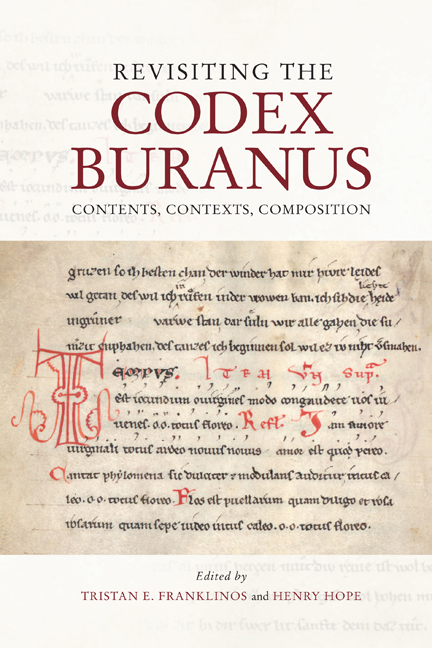Book contents
- Frontmatter
- Contents
- List of Illustrations
- Acknowledgements
- Abbreviations
- Dedication
- Introduction: The Codex Buranus – A Unique Challenge
- Chapter 1 A Modern Reception History of the Codex Buranus in Image and Sound
- Chapter 2 Parody in the Codex Buranus
- Chapter 3 Satire in the Codex Buranus
- Chapter 4 ‘Artes Amatorie Iam Non Instruuntur’: Learned and Erotic Discourse in the Carmina Burana
- Chapter 5 Classical Learning and Audience in the Carmina Amatoria: A Case-Study on CB 92
- Chapter 6 Rape, the Pastourelle, and the Female Voice in CB 185
- Chapter 7 Rethinking the Carmina Burana III: The Poetry of Peasants
- Chapter 8 Predestination and God’s Grace: The Salvific Architecture of the Religious Songs in the Codex Buranus
- Chapter 9 Revisiting the Plays of the Codex Buranus
- Chapter 10 Revisiting the Music of the Codex Buranus
- Chapter 11 Locating the Codex Buranus: Notational Contexts
- Chapter 12 Plurilingualism in the Codex Buranus: An Intercultural Reconsideration
- Chapter 13 Compilation, Contrafacture, Composition: Revisiting the German Texts of the Codex Buranus
- Afterword: multiformis armonia, scolaris symphonia
- List of Manuscripts
- Bibliography
- Index
- General Index
- Studies in Medieval and Renaissance Music
Chapter 7 - Rethinking the Carmina Burana III: The Poetry of Peasants
Published online by Cambridge University Press: 16 September 2020
- Frontmatter
- Contents
- List of Illustrations
- Acknowledgements
- Abbreviations
- Dedication
- Introduction: The Codex Buranus – A Unique Challenge
- Chapter 1 A Modern Reception History of the Codex Buranus in Image and Sound
- Chapter 2 Parody in the Codex Buranus
- Chapter 3 Satire in the Codex Buranus
- Chapter 4 ‘Artes Amatorie Iam Non Instruuntur’: Learned and Erotic Discourse in the Carmina Burana
- Chapter 5 Classical Learning and Audience in the Carmina Amatoria: A Case-Study on CB 92
- Chapter 6 Rape, the Pastourelle, and the Female Voice in CB 185
- Chapter 7 Rethinking the Carmina Burana III: The Poetry of Peasants
- Chapter 8 Predestination and God’s Grace: The Salvific Architecture of the Religious Songs in the Codex Buranus
- Chapter 9 Revisiting the Plays of the Codex Buranus
- Chapter 10 Revisiting the Music of the Codex Buranus
- Chapter 11 Locating the Codex Buranus: Notational Contexts
- Chapter 12 Plurilingualism in the Codex Buranus: An Intercultural Reconsideration
- Chapter 13 Compilation, Contrafacture, Composition: Revisiting the German Texts of the Codex Buranus
- Afterword: multiformis armonia, scolaris symphonia
- List of Manuscripts
- Bibliography
- Index
- General Index
- Studies in Medieval and Renaissance Music
Summary
The pastoral poetry of the Latin Middle Ages is rich in experimentation. Who will deny ingenuity to Metellus of Tegernsee when, c. 1160 in the fourth Eclogue of his Quirinalia, he performed this feat of emulation:
incipe, taure tener, mugitu noscere matrem!
Begin, little bull, to acknowledge your mother with a moo!
(Metellus, Eclogues, 4.23)Few readers in that cultivated cloister would have failed to recognise Metellus's model in Vergil, Eclogue 4, a verse which Christian tradition construed as referring to the nativity of the Messiah:
incipe, parue puer, risu cognoscere matrem!
Begin, little boy, to acknowledge your mother with a smile!
(Vergil, Eclogues, 4.60)The smiling saviour at Bethlehem has given way to the mooing of a votive calf near Tegernsee: is this what Metellus means by transforming Vergil's model and bringing it up to date? Before shuddering at the solecism, perhaps we should reflect that others, centuries before Metellus, had filled Classical form with Christian content. Endelechius (c. 400) and Paulinus of Nola soon after him wrote poetry about animals and saints that could be classified as bucolic according to the simple criteria advanced at Tegernsee by a scholar who was drawing on Isidore of Seville:
Bucolicon: id est, pastorale carmen a digniore parte tractum; id est, boum custodia.
Bucolic: that is, pastoral poetry treated from a more elevated angle; that is, husbandry of cattle.
(Isidore, Origines, 1.39.16)Care of cows, a theme recurrent in the Quirinalia, did not entail sympathy for peasants on Metellus's part. When the Corydon of his second Eclogue is repeatedly called ‘rusticus’ (2.34–36), there is none of Vergil's tender teasing (Eclogue 2.56). That term, in the Quirinalia, is synonymous with ‘lout’. The peasant of the twelfth century is portrayed as ignorant and misguided like his peers in earlier ages. Still impervious to the instruction and correction which Martin of Braga offered half a millennium earlier, the rustic is dismissed by Metellus and others as an inarticulate oaf, without even the solace of an ungrammatical idiom attributed to him.
- Type
- Chapter
- Information
- Revisiting the Codex BuranusContents, Contexts, Compositions, pp. 171 - 204Publisher: Boydell & BrewerPrint publication year: 2020



